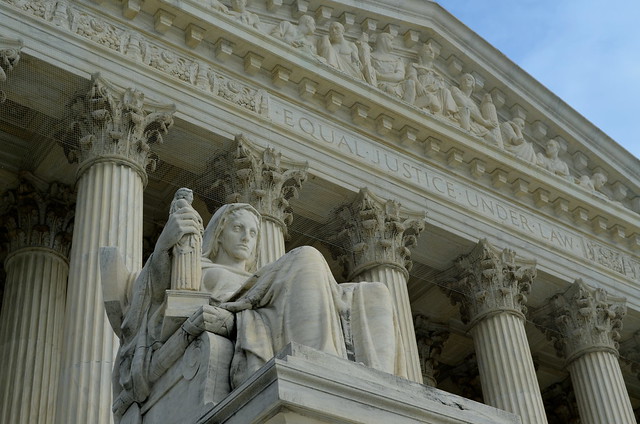Justifying the McCutcheon decision on the basis of healthy disclosure is reckless when it is well known that the government isn't demanding it or providing it in a useful way.
Continue readingReal time transparency bill a real time response to McCutcheon
Sen. Angus King responded quickly to the Supreme Court’s decision in McCutcheon v. FEC today, announcing the Real Time Transparency Act of 2014, requiring 48-hour disclosure of hard money campaign contributions of $1,000 or more.
Continue readingSunlight’s Response to SCOTUS Ruling on McCutcheon v FEC
Today, the Supreme Court handed down its decision on the campaign finance case, McCutcheon v. the Federal Election Commission, ruling that aggregate limits over direct contributions to political candidates are unconstitutional under the First Amendment.
Continue readingYes, Mr. Bauer, the McCutcheon case is a big deal
Bob Bauer argues that striking down the $123,200 hard money limit of campaigns — the goal of plaintiff Shaun McCutcheon — would not make much of a difference. Here's why he's wrong.
Continue readingMost likely to exceed: Who’s poised to double down post-McCutcheon
In advance of an expected Supreme Court decision on campaign finance limits, the Sunlight Foundation and Center for Responsive Politics look at donors most likely to exceed them.
Continue readingReal-Time Disclosure — One Simple Fix for a More Informed Public
As the Supreme Court continues its assault on campaign finance limits, we have a modest proposal for more informed citizens and a more accountable government.
Continue readingResources Tool Kit: McCutcheon v. FEC
Breaking the limit: How the stealthy wealthy engaged in checkbook lobbying
Striking down the limits on how many federal candidates and party committees an individual can shower with campaign cash--the main issues in McCutcheon v. Federal Election Commission--would not only open the door to bigger money in politics, it could also open the door to stealth lobbying campaigns on Capitol Hill by well-heeled donors. We know that because it already has happened, when limits were in place but not enforced. More than two decades ago, when Congress considered reforms that would put the brakes on hostile takeovers by corporate raiders, some of them used their checkbooks and their access to derail the effort without ever disclosing their lobbying efforts. Back in 1989, federal election law limited the amount an individual could give to candidates, parties and political action committees to $25,000. That year Texas billionaire and corporate takeover artist Harold C. Simmons contributed $45,500. That year Simmons, a staunch Republican now best known for seven-figure contributions to groups like Swift Boat Vets for Truth and American Crossroads, gave plenty to GOP pols. But, unusual for him, he also wrote $1,000 checks to Democratic stalwarts like Sens. David Boren, D-Okla., Paul Simon, D-Ill., and Max Baucus, D-Mont., as well as a $15,000 check to the Democratic Senatorial Campaign Committee.

Texas billionaire Harold C. Simmons
The 1,000 donors most likely to benefit from McCutcheon — and what they are most likely to do
If the Supreme Court lifts limits on aggregate individual campaign contributions, as it may very likely do in McCutcheon v. Federal Election Commission, it will empower the limited number of donors who have the heart, the stomach and the bankrolls to contribute hundreds of thousands of their own money to determine who is in office. These truly elite donors are poised to be the big winners.
In our recent analysis on the 1% of the 1%, we looked at the top 31,385 donors (.01% of the U.S. population). Today, we will focus just on the top 1,000 donors: the donors most likely to up their political giving if they are given the chance to donate even more. All of these donors contributed at least $134,300 of their own money in the 2012 election.
Our best guess is that parties and leadership committees will converge on these donors, giving roughly 1000 people a unique ability to set and limit the party agendas. Presumably, they will shift their money from super PACs to party committees because giving directly to party and leadership committees affords these donors more opportunities to talk directly to party leaders, and increases their bargaining power within the party structure. And party leaders want to control the money and the messages it buys.
 2. Almost 2/3 of the Top 1,000 donors primarily support Republicans
2. Almost 2/3 of the Top 1,000 donors primarily support Republicans
How many donors will benefit if the Supreme Court allows unlimited campaign contributions?
Yesterday, my colleague Lisa Rosenberg previewed what’s at stake in the upcoming Supreme Court case, McCutcheon v. Federal Election Commission. On Oct. 8, judges will rule on the constitutionality of the overall limit on contributions to federal candidates and political parties. Currently, the limits are set at $74,600 to political committees, and $48,600 to candidates – $123,200 overall. If the court sides with the plaintiffs, those limits will be a thing of the past.
Everybody is buzzing about what will happen if the courts lift the aggregate limits. Will more donors start writing multi-million dollar checks? Will the campaign finance system flood with even more money?

- « Previous
- 1
- 2
- 3
- 4
- Next »


